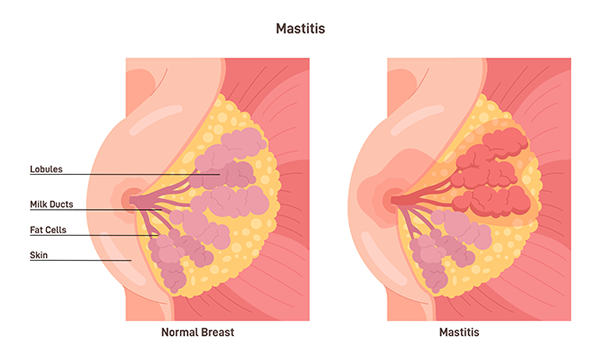Mastitis and Other Breastfeeding Issues You Need to Tell Your Doctor About

Breastfeeding can be a beautiful bonding experience for moms and babies, but it doesn’t always go smoothly. While some moms may navigate breastfeeding without any issues, others can experience complications like mastitis, clogged ducts, or nipple pain that require attention.
At North Pointe OB/GYN in Cumming, we’re here to support you through every stage of motherhood, including managing breastfeeding complications.
In this blog, we’ll highlight some common breastfeeding issues and explain why it’s essential to talk to your doctor about them.
What is Mastitis and How Do I Know if I Have It?
Mastitis is a condition that occurs when the breast tissue becomes inflamed, often due to a blocked milk duct or bacterial infection. It’s more common in the early weeks of breastfeeding, but it can happen at any time. Mastitis is often painful and can cause flu-like symptoms that leave you feeling exhausted.
Common Signs of Mastitis:
- Breast pain or tenderness: If your breast feels sore, hard, or warm to the touch, it could be a sign of mastitis.
- Red streaks on the breast: Redness and swelling in a particular area of the breast may indicate an infection.
- Fever and chills: Mastitis can cause flu-like symptoms, including a high fever, body aches, and chills.
- Fatigue: If you’re suddenly feeling unusually tired while breastfeeding, mastitis could be the culprit.
If you notice any of these symptoms, it’s important to contact your doctor right away. Untreated mastitis can lead to a more serious infection called a breast abscess, which may require drainage.
Clogged Milk Ducts: A Common Breastfeeding Issue
Clogged milk ducts can also cause discomfort while breastfeeding. They occur when milk is trapped in a duct, leading to a blockage. Left untreated, clogged ducts can develop into mastitis, so it’s crucial to address them early.
Symptoms of a Clogged Milk Duct:
- A small, tender lump in the breast
- Swelling or discomfort in one area of the breast
- Decreased milk flow from the affected breast
Most clogged ducts can be relieved by frequent nursing or pumping, gentle breast massage, and applying heat to the affected area. However, if the issue persists or worsens, it’s time to see your doctor.
Cracked or Sore Nipples: When Should You Be Concerned?
While it’s common to experience some nipple soreness in the early days of breastfeeding, persistent pain or cracked nipples may signal a problem. If your nipples are bleeding, blistered, or extremely sore, it could be due to improper latch, poor positioning, or a tongue-tie in your baby. These issues can make breastfeeding more challenging and painful.
Don’t suffer in silence—if you’re struggling with sore nipples, contact your healthcare provider. They can assess your breastfeeding technique and offer suggestions or referrals to a lactation consultant for additional support.
Thrush: An Infection That Can Affect Both Mom and Baby
Thrush is a yeast infection that can develop in both the baby’s mouth and the mother’s nipples during breastfeeding. It’s caused by an overgrowth of Candida, a type of fungus that thrives in moist environments.
Symptoms of Thrush:
- For mom: Itchy, burning, or cracked nipples; shooting pain in the breast during or after nursing.
- For baby: White patches on the inside of the baby’s mouth or tongue; fussiness during feedings.
If you suspect thrush, it’s important to seek treatment for both you and your baby to prevent the infection from being passed back and forth. Your doctor may prescribe antifungal medication to clear up the infection.
Engorgement: How to Relieve the Discomfort
In the early days of breastfeeding, many moms experience breast engorgement—when the breasts become overly full and hard, making it difficult for the baby to latch. Engorgement can be painful and may lead to clogged ducts or mastitis if not addressed.
To prevent or relieve engorgement, try:
- Frequent nursing: Aim to nurse your baby often, especially in the early days.
- Hand expressing or pumping: If your baby isn’t nursing enough, you can express milk to relieve pressure.
- Cold compresses: Applying cold compresses to the breasts can help reduce swelling and discomfort.
If engorgement persists or worsens, your doctor can provide guidance on how to manage it and maintain a comfortable breastfeeding experience.
Why It’s Important to Talk to Your Physician About Breastfeeding Issues
Breastfeeding is a natural process, but that doesn’t mean it’s always easy. If you’re experiencing complications like mastitis, clogged ducts, or cracked nipples, it’s important to seek help from a healthcare professional. Early intervention can prevent more serious issues from developing and make your breastfeeding journey smoother.
At North Pointe OB/GYN, we offer comprehensive care and support for breastfeeding moms. Whether you’re dealing with mastitis or another breastfeeding concern, our team is here to provide expert advice and treatment options that fit your needs.
Why Choose North Pointe OB/GYN for Breastfeeding Support?
Our obstetrics team at North Pointe OB/GYN provide compassionate and expert care for moms in the Cumming area. With years of experience in women’s health and breastfeeding support, we’re here to guide you through the challenges of motherhood with personalized solutions that work for you.
We understand that breastfeeding complications can be overwhelming, but you don’t have to navigate them alone. Our practice is committed to helping you maintain your health and well-being while providing the best care for your baby.
Contact Us for Breastfeeding Support in Cumming
If you’re struggling with mastitis or other breastfeeding issues, don’t wait to seek help. Contact North Pointe OB/GYN in Cumming today to schedule a consultation with one of our experienced providers. We’re here to help you overcome breastfeeding challenges and enjoy a healthy, happy breastfeeding experience.


